Who We Are
-
A SMALL TO MEDIUM ENTERPRISE-FOCUSED LENDER

INTRODUCTION
As a small to medium enterprise-focused lender, our success has come from the knowledge that risk in Africa is often misunderstood and that customer needs in the region are unique to each business.
We take a long-term partnership approach with our customers and supplier partners in the belief that we will prosper only if our customers and supplier partners prosper and boast a family of customers that spans the region.
We are headquartered and regulated as a credit provider in Mauritius, with representatives in West, Central, East Africa and Mauritius. Our team is made up of career financial professionals with a deep pool of expertise spanning asset-based finance, asset management, investment banking, agriculture, resources and corporate banking. Through this depth of expertise, we’ve built a business focused on providing growth capital to high-quality businesses in the region.
PHILOSOPHY
Following growing global urbanisation, particularly in Africa, an urgent need for investment in infrastructure has arisen. On this still-developing continent, the key industries are largely small to medium sized enterprises, and this is where 90% of African people are employed.
Despite a spike in technological advances, thanks to smart-phone saturation into most of the corners of Africa, small to medium sized enterprises generally still do not meet the requirements to be awarded funding and finance from the traditional banking sector in order to help their businesses grow.
At Loinette, we are proud to step in and assist established small to medium sized enterprises to create sound business plans, tailor unique financing packages to help these enterprises develop by addressing their funding shortfalls.
Simultaneously, we give our investment partners excellent return on investment. Our injection of around US$300 million into the development of infrastructure across Africa in recent years has had a positive impact on many lives.
Not only have the development projects consistently provided our investors with excellent returns, but the far-reaching socio-economic spin-offs will continue to yield positive results for the people of Africa for many decades to come.
SHAREHOLDER BRIEF
Loinette Capital Limited is 75% owned by Cim Financial Services Limited and 25% by I.A. Bell and Company (Pty) Ltd.

CIM Financial Services Ltd, trading as Cim Finance, is the largest non-banking financial institution in Mauritius. It is regulated by the Financial Services Commission, listed on the Official Market of the Stock Exchange and is licensed as a Payment Service Provider with the Bank of Mauritius to conduct payments activities. Driven by its mission to uplift their lives and build better futures, Cim Finance has developed a wide range of flexible financing solutions suitable for individuals, small to medium enterprises and large businesses. The group has over 800 employees across Mauritius, Rodrigues and Kenya and operates across two main clusters namely; the Finance cluster and the Investment cluster. Cim Finance has been offering financial solutions to consumers, small to medium enterprises and large corporates since 1987 and currently has close to 100 retail points-of-sale across Mauritius. As it is listed on The Stock Exchange of Mauritius, it is classified as a public interest entity under the Financial Reporting Act 2004. It is required to adopt and report on its corporate governance practices in accordance with the National Code of Corporate Governance (2016). It currently has USD 425 million in assets and USD 113 M in share holders’ reserves.

For more information, click here.

I.A. Bell and Company (Pty) Ltd, is a family investment holding company registered in South Africa.The holding company are also the majority shareholder of Bell Equipment Limited, amining, construction and agricultural equipment manufacturer listed on the Johannesburg Stock Exchange.
For more information, click here.
TEAM
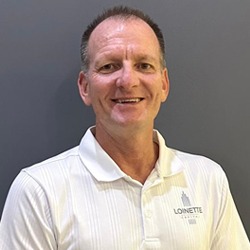
DEREK CRANDON
Chief Executive Officer
DEREK CRANDON
Chief Executive Officer
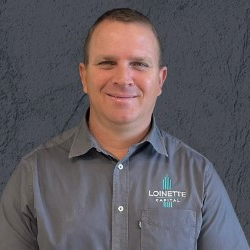
NICK SCHILZ
Chief Financial Officer
NICK SCHILZ
Chief Financial Officer
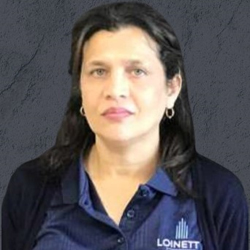
SHIRLEY COUTET
Administration
SHIRLEY COUTET
Administration
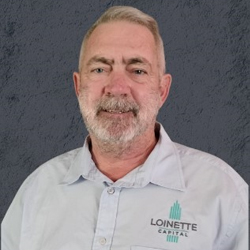
SHARL D’HOTMAN DE VILLIERS
Asset Management
SHARL D’HOTMAN DE VILLIERS
Asset Management

ROBERT KOON TAK WAH
Finance Manager
ROBERT KOON TAK WAH
Finance Manager
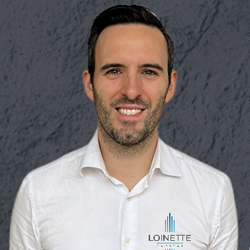
DONATIEN DEPUYDT
Business Head West Africa
DONATIEN DEPUYDT
Business Head West Africa

KEVIN HO
Accountant
KEVIN HO
Accountant
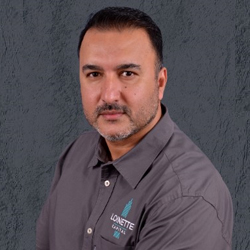
PAUL CHAGGAR
Business Head East Africa
PAUL CHAGGAR
Business Head East Africa
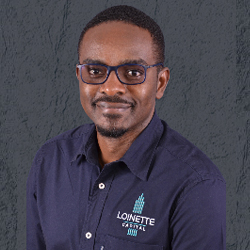
ERIC CHEGE
Credit Analyst East Africa
ERIC CHEGE
Credit Analyst East Africa
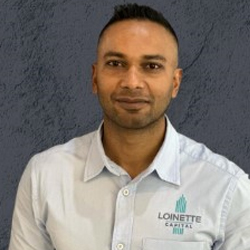
LINDSAY MASHER
Senior Credit Analyst
LINDSAY MASHER
Senior Credit Analyst
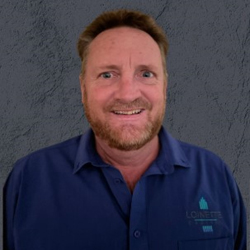
ALAN JEFFERIES
Head Business Development
ALAN JEFFERIES
Head Business Development
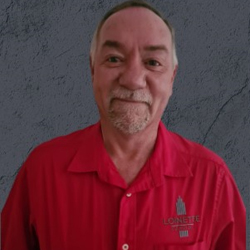
PAUL WESTRAADT
Head of Credit
PAUL WESTRAADT
Head of Credit

TARA VAN DER WALT
Office Manager
TARA VAN DER WALT
Office Manager
DIRECTORS
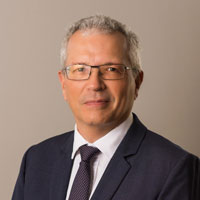
MARC LAGESSE
Chairman
MARC LAGESSE
Chairman
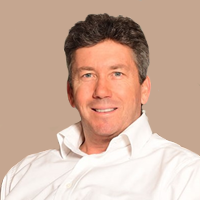
COLIN TAYLOR
Non-Executive Director
COLIN TAYLOR
Non-Executive Director

NICK CHIN
Director
NICK CHIN
Director
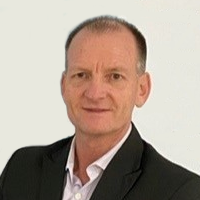
DEREK CRANDON
Director
DEREK CRANDON
Director
WHAT WE DO
We specialise in relationship-building. Our strengths are building and maintaining strategic relationships in the key business sectors of emerging markets. These alliances, backed by the strong foundation of long-standing co-operation agreements with major international manufacturing equipment dealership networks, empower us to offer investors and small to medium enterprises excellent growth opportunities for investment and developing businesses.
Using our extensive knowledge and experience of emerging markets, we carefully vet locally owned businesses, identifying those with excellent potential and reliability, and support them financially to aquire the machinery they need to fulfill the contract they have. As relationship-based finance specialists, we pride ourselves on getting to know our customers personally to facilitate the growth of their business. Our philosophy is simple – when our customers and supplier partners do well, so do we.
MARKET SECTORS
INFRASTRUCTURE
Currently, Africa invests just 23.5% of its GDP into infrastructure, which must increase to 37% to meet the continent’s development targets.
This shortfall implies a funding gap of US$11.4 trillion by 2040 and presents foreign investors with a noteworthy funding opportunity.
To date, successful projects include wider telecommunications coverage and access to potable water, however regional disparities remain in terms of energy and transportation infrastructure, with only one quarter of the continent’s 2.8 million kilometres of roads paved.
Robust and reliable infrastructure is a key driver of economic and social development, with small to medium enterprises and economic production relying heavily on infrastructure networks such as roads, telecommunications systems and the steady supply of energy and water. The World Economic Forum estimates that Africa’s workforce will increase by a staggering 910 million people between 2010 and 2050, of which 839 million will be in sub-Saharan Africa. This will put incredible pressure on existing infrastructure, much of which already falls short of development goals, and is forcing governments to prioritise infrastructure spending. It is estimated that the continent will need to spend US$6 trillion over the next 20 years to build, upgrade and maintain its infrastructure.
While there has been a marked improvement in technological infrastructure, much investment is needed in the base level infrastructure to sustain economies and accommodate population growth, increased urbanisation and increased commercial agriculture and agri-business. All of which requires ongoing bespoke financial solutions to fund capital expenditure, working capital and trade finance.
EXTRACTIVE INDUSTRIES
In Africa, there are more than 1, 850 mining projects in various stages of development by many of the largest global mining companies.
Fortunately, there is a positive shift in how mines are funded and run, with increasing focus from the international funding community on the environmental, social and governance standards. There are parallel increases in demand for materials required to update regional infrastructure, as well as export-focused minerals that are required to drive new industries such as electric vehicles and smartphones.
These trends all dictate enhanced investment opportunities.
INSURANCE
Sub-Saharan Africa (excluding South Africa2) accounts for 13% of the global population but only 0.2% of global insurance premiums. Insurance penetration into the region, as measured by premiums/GDP, remains very low at 0.9% relative to the emerging market average of 3.2%. Of this, more than 50% of all premiums in the region are driven by agents and brokers personally, as opposed to online-driven business.
The region’s vastness, combined with a low level of technical and specialist knowledge within the thin broker talent pool, leaves large parts of the small to medium enterprise market underserved and unable to obtain specialist insurance for their businesses. This situation presents enormous opportunity for investment into the insurance sector.
WHY WE ARE SUCCESSFUL
The small to medium enterprise sector in sub-Saharan Africa employs 90% of workers in the region, yet access to formal funding remains unattainable for most of these emerging businesses. We have taken bold steps to fill this funding gap and provide finance small to medium enterprises, where the formal banking sector cannot and will not take the risk.
We believe that the next few decades will present significant investment opportunities in the region as the need for infrastructure development is driven by increasing urbanisation, population growth and a general decrease in the level of poverty.
The small to medium enterprise sector will shoulder the responsibility of supplying short, medium and long term solutions to development in sectors such as agriculture, infrastructure and mining.
Enormous levels of investment are needed to achieve these goals, and small to medium enterprises require specialist finance solutions such as credit facilities and insurance.
Our team, with decades of specialist experience in accessing and managing investment opportunities in developing markets, is uniquely positioned to operate successfully in this opportunity set.
Our bespoke finance and investment solutions are created to overcome the challenges presented by the fact that most African countries rank in the lower half of the World Bank’s Ease of Doing Business rankings – sub-Saharan Africa’s current regional average is 142 of the 190 ranked economies.
WHERE WE ARE
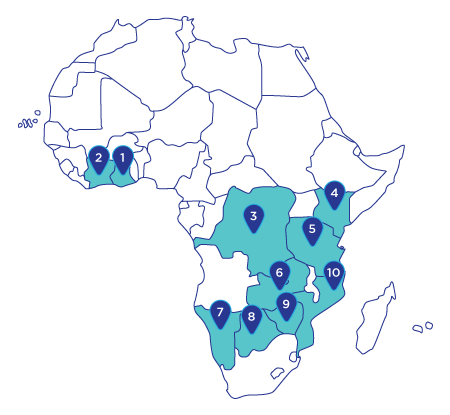
Loinette Capital has transactional presence
in the following countries:
1. Ghana
2. Cote d’Ivoire
3. D.R.C
4. Kenya
5. Tanzania
6. Zambia
7. Namibia
8. Botswana
9. Zimbabwe
10. Mozambique



SOCIAL IMPACT
Local job creation, new schools, new hospitals, well-maintained roads, introduction of electricity supply, housing and other infrastructure development are some of the positive socio-economic spin-offs for the communities in which the Loinette-funded projects operate.
In addition to yielding excellent, consistent returns on investment for funders, the projects have a ripple effect on the wider community, where the benefits will be enjoyed by many future African generations.
One of our clients in the aggregate sector has doubled local employment thereby boosting the coffers of local tax revenues - in addition to boosting trade in the region, thanks to the improved roads. Local children are benefiting from the schools which have now been established.
The agri-sector clients have created jobs, enhanced food stability in the region, and generated community outreach programmes which include schools, clinics, and the provision of land on which the community can grow their own crops. Furthermore, the local people have now embraced sustainable agricultural practices - concern for the environment is key, including pollution-control. Our infrastructure-focused clients have worked on projects such as the East African railway project, which will provide a gateway to several neighbouring countries, stimulating trade and job creation.
Our mining services clients work on projects spanning several countries and are all compliant with local regulations and adhere to their clients’ environmental best practices in order to reduce pollution and foster sustainable environmental practices.